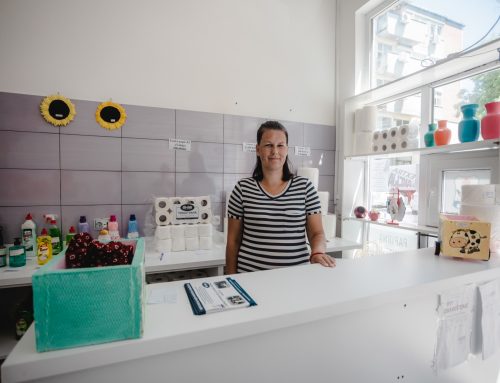EU Delegation to Serbia and Commissioner for Protection of Equality organise a debate on the occasion of International Women’s Day, which will be held in EU Info Centre on March 7th, from 17h00 to 19h00.
Delegation of European union to Serbia and Commissioner for Protection of Equality in cooperation with EU Info Centre, will celebrate International Women’s Day March 8th by organising a campaign “What is my gender-specific occupational title?” which aims to remind the public about the importance of improving the status of women in society and to indicate that one of the means for doing so is the use of gender-sensitive language.
In Serbia, 42% of citizens consider that women are most discriminated group in society, as shown by the research “Citizens’ Attitudes Towards Discrimination against Women in Serbia”, conducted by the Commissioner for Protection of Equality, UN’s Development Programme and CeSID. Women in Serbia, on the average, earn less than men: average salary of a highly educated woman is over RSD17,000 lower that the average salary of a highly educated man.
On the road to European Union, Serbia, as well as any other candidate country applying for full membership, is obliged to pay full attention on respecting human rights, and having in mind that women’s rights are the important part of general human rights, it has to guarantee respecting of non-discrimination principle.
This is why EU Delegation to Republic of Serbia and Commissioner for Protection of Equality started a campaign, which will last from March 3rd until March 8th 2014, and will consist of publishing blogs on EU Info Centre’s website, blogs written by distinguished female authors on the topic of women’s rights, and of a debate “What is my gender-specific occupational title?” which will be held in EU Info Centre on Friday, March 7th 2014.
Blogs – author texts will be published daily and will be available on http://euinfo.rs/sr/blog.html. First blog was written by Serbian Youth Umbrella Organisation’s (KOMS) collaborator Sonja Budiša Milenković who wrote “What about women wanting equal employment conditions?”. Attitudes towards the state of women will be shared by Biljana Stepanov and Gordana Rajkov, members of the “Europe Team” Serbia expert network, as well other female authors.
“What is my gender-specific occupational title?” debate, which is organised by EU Delegation to Serbia and Commissioner for Protection of Equality in cooperation with EU Info Centre, will be held on March 7th 2014, aims to indicate the use of gender-sensitive language as one of the means for improving the status of women in society. The debate will be held in EU Info Centre Office in Belgrade Youth Centre (Americana Hall), starting at 17h00.
Through conversation with prominent figures from the fields of culture, media and art, we want to find the answers to questions such as:
What are the reasons for resistance to using gender specific profession titles? Why this question isn’t just a linguistic one? Can this be a step towards destroying the patriarchal pattern of gender roles? What do “weaker” and “gentler” sex mean? Does a dominant division of women as housewives and men as directors still exist? Why 40% of Serbian citizens consider that women are the most discriminated group in our country?
EU Delegation will be represented by H.E Ambassador Michael Davenport. Commissioner for Protection of Equality Nevena Petrušić, Secretary of State at the Ministry of Culture Gordana Predić, TV hostess and journalist, Olja Bećković, actress Mirjana Karanović, Director of Belgrade Centre fo Safety Policy Sonja Stojanović Gajić, and linguist Vlado Đukanović will also participate in the debate. Journalist Miša Stojiljković will be the debate moderator.
EU Delegation will celebrate March 8th International Women’s Day by organising another event in cooperation with Belgrade Fund for Political Excellence and Women’s Parliamentary Network: on the International Women’s Day in the framework of Women for Democracy and Equality project, which is funded by EU and Embassy of Finland, and which is implemented by Belgrade Fund for Political Excellence, the Women Pre-election Convention “I Vote for Women” will be held. Starting at 10h00, meeting will be held in Belgrade Youth Centre, Americana Hall, with the participation of the Ambassador Michael Davenport and representatives of State Authorities and country politicians.
For further information: Marina Rakić, EU Info Centre, marina.rakic@euinfo.rs , tel: 064 1718 057
Background – About the International Women’s Day
March 8th International Women’s Day, established in early 20th century, celebrates women’ achievements and raises awareness about the needs that women throughout the world face only because of their gender identity. Thousands of festivities are held on this day in order to inspire women and celebrate their current progress. In EU Member States, gender equality is guaranteed by the EU Treaty and Charter of Fundamental Rights. EU makes an effort to correct the gender inequalities reflected in data: women comprise only 15% of all the Executive Boards; Europe 2020 Growth Strategy predicts that over the next six years this figure should be 40%. Women are still less paid than men in Europe and they work without pay up to 59 days, meaning they have to work 59 days more in order to be paid the same salary as men, European Commission announced on the occasion of Equal Pay Day, which is celebrated every year on February 28th. The average difference between the working hour prices of women and men amounts 16%, while in 2012 amounted 16,4%. “Equal Pay Day reminds us that women are facing great inequalities when it comes to labour market. This inequality was just slightly corrected in past few years.” said Viviane Redding European Commissioner for Justice. Public Opinion Research conducted in November 2013, showed that 42% of citizens consider women to be the most discriminated group of the society. European Union strongly supports the improvement of state of women in Serbia through several projects, as well as through strengthening the role of women in creating local policies and women empowerment in business sector.




